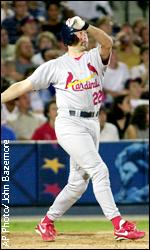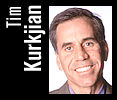It was 1989, Game 5 of the National League Championship Series. The Giants had the go-ahead run at second base with two outs in the eighth inning. The Cubs brought in reliever Mitch Williams to face Will Clark. Kevin Mitchell, the on-deck hitter, said to Clark, "you know what you have to do." Clark gave him that look -- the Nuschler look, it would later become -- and said "it's done."
Clark went on to drill an RBI single to center, sending the Giants to the World Series.
|  | | Will Clark follows through on one of his signature home-run swings. |
That was Will Clark at his best. Thursday, he retired. He will not be going to the Hall of Fame, as many predicted in 1989 that he someday might. Still, Clark finished a very solid career with a .303 batting average, 2,176 hits, 284 home runs and 1,203 RBI in 15 years in the major leagues. He had that beautiful swing with that great, high follow through, just like in a highlight reel. In the movie Little Big League, Timothy Busfield tried to imitate that swing.
Clark was nicknamed "The Natural" after jumping to the big leagues in 1986 after only 65 games at Class A Fresno. In his first major league at-bat, he homered off Nolan Ryan in the Astrodome. After the 1989 season, during which he finished second in the MVP voting to Mitchell, he was considered among the game's best players. He was brash, loud and arrogant, a guy who thought he could hit any pitcher, then went ahead and did. He played with great intensity, and he had that look, that strange facial contortion when he was really focused on what he was doing.
"I've seen that face many times," former teammate Billy Ripken once said. "I've seen that face when he's eating a sandwich." The Nuschler look, named after his middle name.
Clark had other good seasons, but he never got better after 1989. Injuries, especially to his elbow, took away some of his power. He never lost that marvelous swing, but while other players got significantly bigger and stronger through offseasons of weight lifting and conditioning, Clark didn't until later in his career. He rather relied mostly on his enormous natural ability. That, however, wasn't enough to keep up with the new wave of power hitters, many of them first basemen: from 1995-99, Mark McGwire hit exactly as many homers as Clark hit in his career.
Clark was not the great clubhouse leader that some made him out to be, but he played hard, he played to win and he played through a great deal of pain. And he saved some of his best for last. When McGwire got hurt this summer, the Cardinals traded for Clark for some insurance at first base down the stretch. He made sure St. Louis got in the playoffs, hitting .345 with 12 home runs and 42 RBI over the final two months of the season. Clearly, he went out nearly on top.
He also played with the Rangers and with Baltimore after leaving San Francisco, but he will be remembered best as a Giant. Last summer, when he was in Oakland with the Orioles, he visited Pac Bell Park, which he had never seen. "They wouldn't let me in," Clark said, smiling. "The security guy knew who I was, but I couldn't get in without a ticket."
Will Clark deserved better than that.
ESPN The Magazine's Tim Kurkjian is a frequent contributor to ESPN.com. | |
ALSO SEE
Thrill is gone: Will Clark retires after 15 seasons
|


